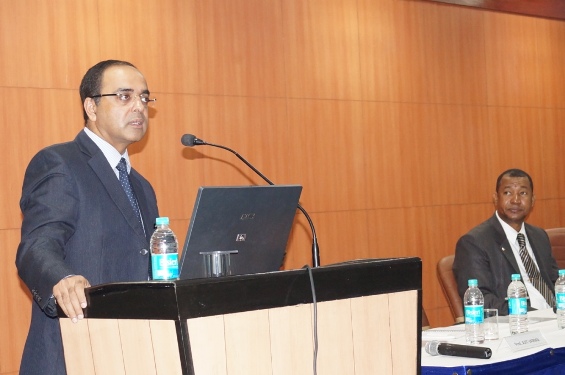24 Sep 2012|Noida | Amity University Campus, Sector-125 Noida
"India needs to step up private sector contribution in R& D from current 20-25% of GERD to 40-50%”remark experts during 8th Foundation Day of Amity Institute of Microbial Technology

Amity Institute of Microbial Technology (AIMT) observed its 8th Foundation Day at Amity University, Sector-125, Noida with brief lectures and talks by eminent experts from the industry.
Welcoming the august gathering, Dr. Ajit Varma- Pro VC, Science and Technology (International) and Director General, Amity Institute of Microbial Technology gave a brief presentation regarding the R&D activities being carried out in AIMT with a special reference to the discovery of new cultivable symbiotic fungus Piriformospora Indica which boosts the growth of the plants, improves their overall health and increases their yield. Dr. Varma also dwelt upon the various projects he has been working on in various parts of Punjab to help farmers increase the yield of various crops with the help of P. Indica.
Sharing his views on “Academia –Industry Link”, Mr. Dipanjan Banerjee -Sr. Asst. Director - Science & Technology/Innovation, FICCI highlighted key issues affecting the Science, Technology and Innovation across the country such as low investments in R&D by Private Sector, weak linkages between Academia- Industry- Government, Dearth of human resources and Technology Transfer from research institutions to the industry. Mr. Banerjee opined that innovation should be “Inclusive”, “Social”, “Rural” and include those who are at the bottom of the pyramid. Outlining the roadmap to inclusive Innovation, Mr. Banerjee stressed that India’s huge diversity provides tremendous opportunity to become “Laboratory to the World” and adding to that is the presence of huge BoP (Below the Poverty Line) population which provide ample opportunities for Indian organizations to research and innovate processes, products and services to cater to BoP. He remarked that intellectual capital is not optimally utilized in India and overall R&D spending in India is just 8% of GDP of which private sector contribution is only 20%, whereas globally, the private sector spending on R&D is in the range of 40-75%. He opined that there is a pressing need to increase investment in R&D especially from private sector to 40-50% of GERD, which could improve the R&D in the country.
H.E Mr. Waven Williams -High Commissioner, Seychelles expressed that Seychelles, which is a small country spread over 150 islands with a population of 97,000, has always promoted R&D amongst the citizens. Applauding the extensive R&D activities carried out in Amity, H E expressed his keen desire to associate with Amity in the area of joint research and innovation programmes.
Dr. Manu Jaggi- Vice President, Dabur Research Foundation presented his views on the very interesting topic “Drug Discovery in India”. Dr. Jaggi shared that developing a new medicine takes an average of 10-15 years and relatively few drugs survive the clinical trial process due to important parameters such as efficacy, potency, safety, availability and toxicity. “the global revenues for research is 72.7 billion(USD) and India represents only 2% which does not do justice to our capabilities”, asserted the speaker. He opined that India could be a hot destination for R&D by alleviating bottlenecks in the R&D pipeline, reducing R&D costs and accelerating clinical trials. Dr. Jaggi lamented that Indian Pharma typically avoids high risk R&D and therefore in the process, miss out on high gain opportunities. Sharing few important tips with students which could help them to succeed in any profession, Dr. Jaggi called upon them to clearly identify what do they want to do, stay focused and become masters of whatever they do, work on their written and oral communication skils, have patience and love their professionals.
While sharing his views during the occasion, Mr. Harsh Bhagchandka- CEO, International Panaacea Ltd. stressed the importance of R& D in the country and said that R&D is very important for promoting innovation, economic growth, infrastructure development and overall progress of the Nation. Citing the problems crippling the Indian R&D, Mr. Bhagchandka stressed that most of the R&D in India is basic and theoretical and cannot be applied or commercialized and adding to the grim situation is the lack of funding from industry or end users. Doling out the potential solution to the problem, he suggested promoting “Public Private Partnership” and “Industry- Academia Partnership” for improving the quality and quantity of Indian R&D.
Also present during the occasion were Dr. Balvinder Shukla- Acting Vice Chancellor, AUUP, Justice Mr. V. K. Gupta (Retd.)-Former Chief Justice, High Courts of HP, Jharkhand & Uttarakhand, Ms. Kalpana Reddy First Secretary for IP, US Embassy, New Delhi who spoke on “Relevance of IPR in Modern Scenario” and Prof. Dr. Rajendra Prasad-Former Rector, School of Life Sciences, JNU who shared his views on “What is exciting in Biology?”